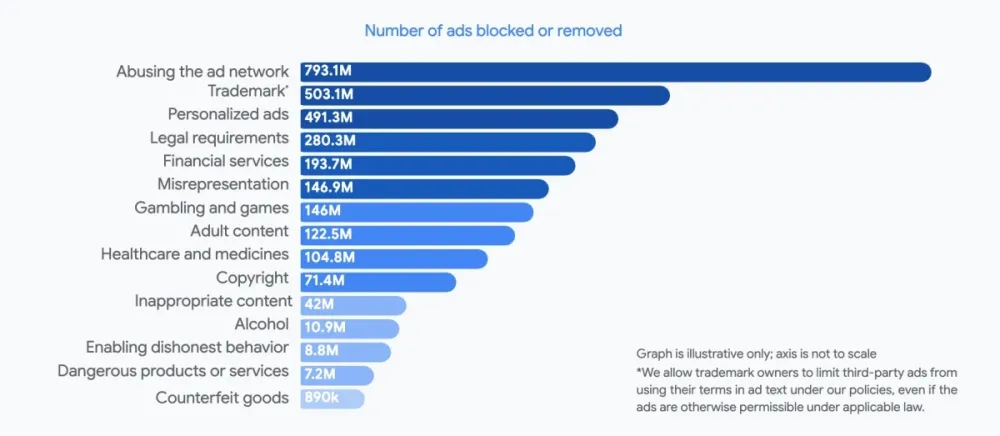
Google has released its 2024 Ads Safety Report, outlining the company’s growing reliance on artificial intelligence to eliminate harmful advertisements and better safeguard its ad ecosystem from fraudulent actors.
Empowered by large-scale natural language models, Google states that AI now enables rapid identification of ever-evolving scams, while also distinguishing between malicious behaviors and those of legitimate advertisers.
According to Google, more than 50 AI-powered enhancements have been integrated into its models to improve the accuracy and efficiency of automated detection. This allows ad teams to focus on nuanced, hard-to-detect cases—while simultaneously training AI systems to better recognize and address such complexities in the future.
In 2023, AI models were responsible for 97% of policy enforcement and webpage detection, contributing to faster site reviews, improved monetization for compliant advertisers, and enhanced protection against ad placements on non-compliant pages.


The adoption of large language model technology has also strengthened Google’s ability to prevent abuse of its ad systems. AI-powered investigation tools now expedite the detection of policy loopholes exploited by bad actors to display billions of non-compliant ads. At the same time, the system ensures that legitimate advertisers can reach potential customers more effectively.
Key figures from the report include:
- Over 39.2 million Google ad accounts were suspended in 2024 for policy violations, preventing the dissemination of harmful ad content across Google’s networks.
- Identity verification for advertisers has proven crucial in curbing repeat offenses, with over 90% of served ad impressions now coming from verified advertisers operating transparently.
To strengthen industry-wide resilience, Google has also collaborated with the Global Anti-Scam Alliance to establish the Global Signal Exchange, a new platform for cross-industry intelligence sharing. In the AI era, Google works with a dedicated team of over 100 experts to analyze emerging scam tactics and implement updated countermeasures—such as revised policies addressing deceptive claims and permanent bans for advertisers promoting scams or misinformation.
To date, Google has permanently disabled more than 700,000 violating advertiser accounts, and reported scam ads have decreased by 90% year-over-year. Additionally, in 2023, Google blocked or removed over 4.15 billion harmful ads and suspended over 5 million accounts for violating scam-related policies.

During election periods, Google has reaffirmed its commitment to platform neutrality by enhancing identity verification and transparency requirements for political advertisers. Users are now better equipped to recognize election-related ads and identify their sponsors. In response to regional regulations, such as those in Taiwan, Google has suspended all political ads promoting parties, incumbents, or candidates since December 15, 2023, and has further tightened policies regarding AI-generated election content.
In total, throughout 2024, Google:
- Removed over 5.1 billion ads
- Restricted more than 9.1 billion ads
- Suspended over 39.2 million ad accounts
- Blocked or restricted ads across 1.3 billion publisher pages
- Took domain-level enforcement actions against over 220,000 publisher websites
- Rolled out more than 30 policy updates affecting both advertisers and publishers
Google emphasized that as deceptive techniques evolve and AI capabilities expand, the digital advertising landscape faces growing risks of abuse. The company reiterated its commitment to meeting these challenges head-on—through collaboration, innovation, and a shared goal of building a safer internet for everyone.
Related Posts:
- Facebook advertisers use user’s sensitive information to display ads
- Cybercriminals Exploit Fake Google Ads to Ransack Advertiser Accounts
- Google Chrome built-in “bad” ads blocking function, triggering some dissatisfaction with advertisers
